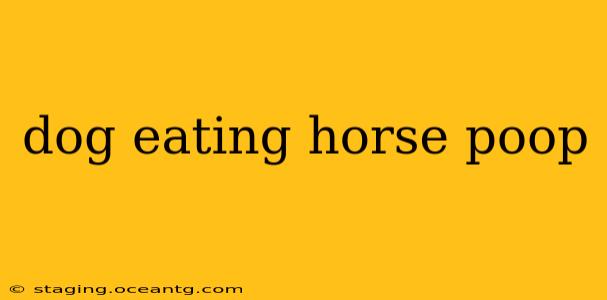Many dog owners face the unpleasant surprise of discovering their canine companion indulging in a rather unappetizing snack: horse manure. This behavior, known as coprophagia (the eating of feces), can be unsettling, but understanding the reasons behind it is the first step towards addressing the problem. While it might seem bizarre, there are several potential explanations for why your dog is eating horse poop, and thankfully, most are easily manageable with the right approach.
Why Do Dogs Eat Poop? (Including Horse Manure)
This question frequently pops up in online searches and forums. Dogs, unlike humans, don't inherently find feces disgusting. Their reasons for this behavior are varied and often linked to underlying issues:
-
Nutritional Deficiencies: A diet lacking essential nutrients can trigger coprophagia. Dogs might seek out manure to supplement their diet, particularly if they're not getting enough protein, fiber, or certain vitamins. This is especially true for dogs who have access to horse manure frequently, as it might contain nutrients absent in their kibble.
-
Pancreatitis: This inflammatory condition affecting the pancreas can lead to nutrient malabsorption, making dogs seek out additional sources of nutrients. This isn't a direct cause of coprophagia in all cases, but it's a possible underlying issue that should be investigated by a vet if you suspect it.
-
Parasites: Intestinal parasites can cause nutrient deficiencies and digestive upset, prompting dogs to seek out supplementary food sources, including manure. Regular parasite prevention and fecal checks are crucial to rule this out.
-
Behavioral Issues: Sometimes, coprophagia is a learned behavior. A puppy might observe its mother or littermates eating feces, leading to imitation. Stress, anxiety, or boredom can also contribute to this behavior, creating a compulsive habit.
-
Taste and Smell: Believe it or not, some dogs might simply find the taste or smell of manure appealing. This is particularly likely if they've had positive experiences with it in the past, accidentally or otherwise.
What Should I Do if My Dog Eats Horse Manure?
Discovering your dog eating horse manure is alarming, but panicking won't help. Here's a systematic approach:
1. Veterinary Check-up: This is paramount. Schedule a visit to rule out any underlying medical conditions like parasites, pancreatitis, or nutritional deficiencies. Your vet can perform tests and recommend a suitable course of action.
2. Dietary Changes: If your vet rules out medical issues, consider improving your dog's diet. Consult your vet or a veterinary nutritionist to ensure your dog receives all the necessary nutrients. High-quality kibble formulated to meet their specific needs is crucial.
3. Environmental Modifications: Prevent access to horse manure. This might involve supervised walks, physical barriers, or training to discourage approaching the area where horse manure is present.
4. Behavioral Modification: If the behavior stems from stress, anxiety, or boredom, work with a certified professional dog trainer to implement appropriate training and enrichment activities.
5. Consistent Training: Use positive reinforcement to discourage manure-eating. Immediate distraction or redirection when you see your dog approaching the manure is effective. Rewards for staying away from the manure will strengthen positive behavior.
Is Horse Manure Harmful to Dogs?
While the immediate dangers of eating horse manure aren't necessarily life-threatening, there are risks:
-
Parasites: Horse manure harbors various parasites that can infect dogs, leading to serious health problems.
-
Bacteria and Toxins: Harmful bacteria and toxins can be present in horse manure, causing digestive upset or more severe illnesses.
-
Toxins from Medications: If the horse has been treated with medications, the manure might contain residues that could be harmful to your dog.
How Can I Stop My Dog from Eating Horse Poop?
Addressing this behavior requires a multifaceted approach combining veterinary care, dietary adjustments, environmental control, and behavior modification. Consistency is key. Be patient, and celebrate every success along the way. Early intervention is crucial in preventing the behavior from becoming ingrained.
This problem is more common than you might think. Don't hesitate to reach out to your veterinarian or a certified dog trainer for personalized guidance if your dog persists in this behavior. Your dog's health and well-being depend on it.
